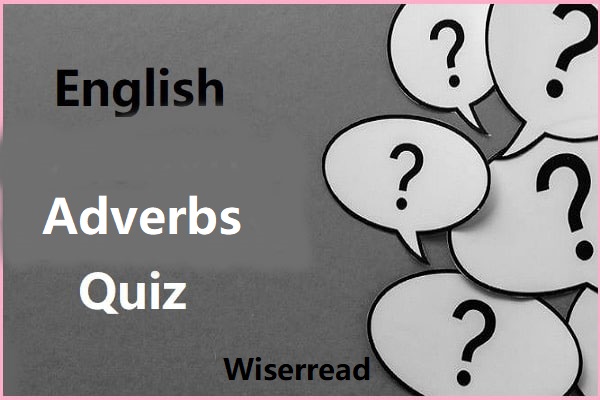Welcome to the Adverbs Quiz. Whether you’re a grammar enthusiast or just looking to brush up on your language skills, this quiz will challenge your understanding of adverbs. Those versatile words modify verbs, adjectives, and even other adverbs.
Test your knowledge, discover new insights, and enhance your writing with the power of adverbs. Ready to start in? Let’s see how well you know these essential modifiers! At the end. You’ll find answers to check your progress.
Top 20 Adverbs Quiz with Answers
If you are weak in English Grammar of Adverbs then try to give this test. You will be able to study it and get a score. Now, let’s start your adverbs quiz.
Example adverbs quiz with answers
Inside, near and away are adverbs of _________.
a. time
b. place
c. Manner
I could be wrong obviously. The adverb “obviously” modifies
a. verb
b. adjective
c. pronoun
Our house is practically on the highway. The adverb “practically” modifies
b. adjective
a. prepositional phrase
c. adverb
Join and test on the prepositional phrases quiz
I never buy fruit at the grocery store. The word “never” is
a. preposition
b. adjective
c. adverb
“I walked backward towards the door.” In this sentence, ‘backward towards’ is an adverbial phrase. State true or false.
a. true
b. false
c. not given
Match the following adverbs with their correct classification “beautifully”
a. adverb of time
b. adverb of place
c. adverb of manner
Match the following adverbs with their correct classification “eventually”
a. adverb of time
b. adverb of place
c. adverb of manner
Match the following adverbs with their correct classification “regularly”
a. adverb of time
b. adverb of frequently
c. adverb of manner
An adverbial phrase is a group of words that describe a noun or pronoun in a sentence. State true or false.
a. true
b. false
An adverb is a word that is used to change, modify, or qualify several types of words including an adjective, a verb, a clause, etc. Is this statement correct?
a. yes
b. no
We rarely go to the movies on the weekends. The adverb “rarely” modifies
a. verb
b. adjective
c. adverb
“With a hammer” is an adverbial phrase of __________.
a. manner/how
b. manner/time
c. why/reason
Which of the following is an adverb?
A) Quick
B) Quickly
C) Quickness
Identify the adverb in the following sentence: “She sings beautifully.”
A) She
B) Sings
C) Beautifully
Choose the sentence that uses an adverb of degree correctly.
A) He runs fast.
B) She is very talented.
C) They walked slowly.
Which sentence contains an adverb of frequency?
A) She always arrives early.
B) He ran quickly.
C) The book is here.
What is the role of the adverb in the sentence: “He completed the task effortlessly”?
A) To modify the noun
B) To modify the verb
C) To modify an adjective
Which of the following sentences contains an adverb of place?
A) She will arrive soon.
B) The cat is under the table.
C) They danced joyfully.
Read also more related topics: Interjections Quiz with Answers
Synonyms Quiz With Answers for Students
English Grammar Online Practice Test
Free English Grammar Test with Answers
FAQ’s on Adverb quiz
What are adverbs, and why are they important?
Adverbs are words that modify verbs, adjectives, or other adverbs, providing additional information about how, when, where, or to what extent something occurs. They enhance clarity and detail in writing, making your sentences more vivid.
How can I prepare for an adverbs quiz?
To prepare, and review the different types of adverbs—such as adverbs of manner, time, place, frequency, and degree. Practice identifying them in sentences and try creating your examples. Online resources and grammar exercises can also be helpful.
Are there any tricks to remember adverb types?
Yes! You can remember the types of adverbs by using mnemonic devices. For instance, think of the acronym “MPTFD” for Manner, Place, Time, Frequency, and Degree. Associating each type with a key question (like “How?” for manner) can also help.
Can adverbs be used in different forms?
Absolutely! Many adverbs are formed by adding “-ly” to adjectives (e.g., “quick” becomes “quickly”). However, some adverbs remain unchanged, like “fast” or “hard.” Familiarizing yourself with these forms will help you recognize them in various contexts.
What should I do if I’m unsure about an answer during the quiz?
If you’re uncertain, try to eliminate any incorrect options first. Look for context clues within the sentence that might indicate the correct type of adverb. Trust your instincts, and don’t hesitate to make an educated guess!
What’s the difference between an adverb and an adjective?
The main difference between an adverb and an adjective lies in what they modify. An adjective describes or modifies a noun, providing information about its qualities, quantities, or states. For example, in the phrase “the tall building,” “tall” is an adjective that describes the noun “building.”
On the other hand, an adverb modifies verbs, adjectives, or other adverbs, often explaining how, when, where, or to what extent an action occurs. For instance, in “She runs quickly,” “quickly” is an adverb that describes how she runs.

